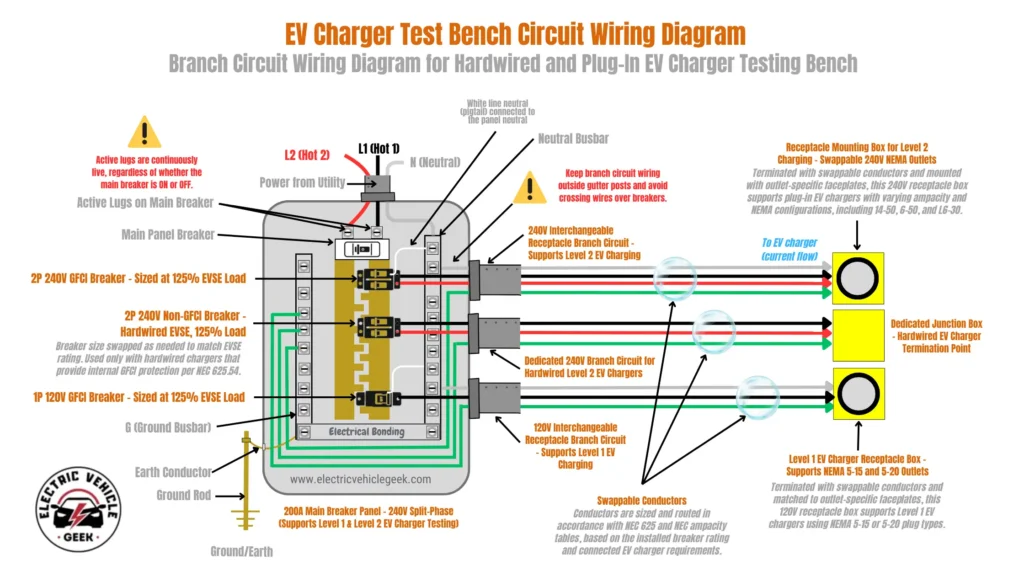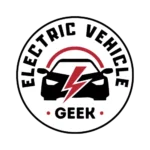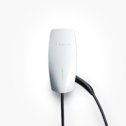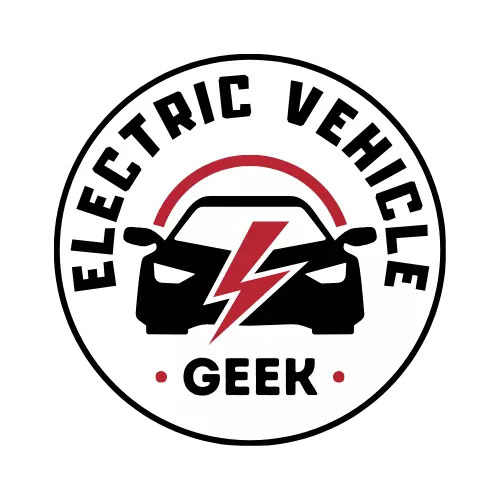How We Review Products
At Electric Vehicle Geek, our goal is to deliver clear, consistent, and technically grounded evaluations of the EV chargers and EV charging accessories we test.
That’s why we’re standardizing our review process. It’s not always easy, especially since real-world charging conditions, home wiring setups, and use cases vary widely.
Still, by combining measurable performance data with hands-on testing and expert installation feedback, we’re able to evaluate EV chargers and accessories on what truly matters.
Our rating system helps you compare chargers and accessories across brands and models based on actual use, build quality, safety compliance, and long-term value, not just specs on paper.
Summary
At Electric Vehicle Geek, we test EV chargers and accessories using custom setups and real-world installations. Our goal is to evaluate safety, performance, and reliability thoroughly.
Each product goes through rigorous lab and field testing, followed by long-term use. After testing, we resell the units locally to reduce waste.
Our reviews are honest and experience-based. We score chargers on features, real-world performance, materials, durability, craftsmanship, design, value, brand reputation, and expert assessment.
Using a standardized 1–10 expert rating system, we help EV owners make confident and informed buying decisions.
How We Rate EV Chargers & Accessories at Electric Vehicle Geek
We rate EV chargers and accessories using a 0-10 scale across 10 key categories:
| Category | What It Measures |
|---|---|
| Features | Core charging functionality, hardware quality, smart features, user convenience, and built-in safety protections. Does it deliver everything it claims, and more? |
| Real World Usage | Day-to-day performance in real conditions. Is it reliable over time, easy to use, and consistent in charging output? Does it meet homeowner or installer expectations? |
| Materials | Build materials across the unit, cable, and plug. Is it built with industrial-grade plastics, UV-resistant housing, and robust connectors that last? |
| Durability | Long-term performance under stress. Can it handle tough environments, repeated use, and outdoor exposure without failing? |
| Craftsmanship | Overall build quality inside and out. How well is it assembled? Are the terminals clean, seals tight, and wiring and circuits laid out with care? |
| Design | Form and function. Is it clean, modern, compact, and practical? Does the cable store easily, the unit mount securely, and the LEDs communicate clearly? |
| Monetary Value | Price-to-performance. Does it offer fair value for the features and build? How does it compare to others in the same price class? |
| Product Value | What you get. Includes warranty coverage, support, cable length, safety certifications, and installation flexibility. Is it a complete solution? |
| Brand Reputation | The company behind the charger. Do they have a history of safe products, good customer support, and solid reviews from both users and electricians? |
| Expert Valuation | Our verdict. How does it hold up after install, teardown, testing, and benchmarking against the best-in-class chargers in this category? |
Our Scoring System Explained
| Score | Meaning |
|---|---|
| 9.8 – 10 | Highest score, achieving exceptional results or exceeding all goals. |
| 9.0 – 9.7 | Highest score, achieving exceptional results, or exceeding all goals. |
| 8.0 – 8.9 | High score, indicating strong performance. |
| 7.0 – 7.9 | Slightly above average, demonstrating some progress. |
| 6.0 – 6.9 | This tends to be the threshold for recommending an EV Charger and Accessory. |
| 5.0 – 5.9 | Slightly below average score, requiring some improvement. |
| 4.0 – 4.9 | Very low score, indicating a significant need for improvement |
| 0 – 3.9 | The lowest score signifies failure or critical issues. |
EV Charger and Accessory Testing
At Electric Vehicle Geek, we test EV chargers and accessories using a structured, real-world process designed to deliver trustworthy, experience-backed reviews you can rely on.
Each product begins with a visual and mechanical inspection to verify proper labeling, build quality, clearances, and grounding. We check all bolted and wired connections using torque tools and DLRO meters, ensuring electrical integrity before applying power. Protective earth tests, touch voltage checks, and conductor resistance measurements confirm the safety of the charger’s metal enclosures and internal connections.
After lab diagnostics, each EV charger undergoes functional testing on our custom-built EV charger test bench, which replicates a full residential branch circuit in line with NEC standards and manufacturer specs.

This phase evaluates real-world usability, compatible EV charging accessories, including mounting, cable management, interface response, and environmental exposure effects. Testing under variable loads, simulated faults, and real EV charging reveals issues like nuisance tripping, grounding errors, communication failures, and other faults that often go unnoticed in lab-only evaluations.
To assess long-term performance and grid impact, we use Power Quality Monitors (PQMs) to measure harmonic distortion, voltage behavior, and load response. Control Pilot (CP) and Proximity Pilot (PP) signaling are verified using precision tools, along with interlock function and earth fault protection timing. Thermal imaging under load exposes early signs of heat stress or internal failure, ensuring the charger’s electrical and mechanical reliability in real-world scenarios.
Every charger is then scored using our proprietary 0–10 scale across 10 key categories, including Features, Durability, Materials, Real World Usage, Craftsmanship, and more. Our goal isn’t to repeat specs; we document actual experiences, performance gaps, and standout strengths to help homeowners, installers, and first-time EV owners choose with confidence.
We also minimize environmental impact by reselling tested units locally whenever possible.
Credibility and Transparency
We only test and recommend EV chargers and accessories that align with our values, rigorously testing and purchasing items ourselves to ensure credibility.
Product Selection Criteria
Selecting the right EV charger is essential for safety, code compliance, and optimal system performance.
We focus on reviewing reliable, high-quality EV chargers and accessories that meet or exceed standards set by the National Electrical Code (NEC), National Fire Protection Association (NFPA 70E), Occupational Safety and Health Administration (OSHA), and National Electrical Installation Standards (NEIS).
Every product we feature is independently purchased, installed according to code, and tested under real-world conditions. Our reviews are based on hands-on testing, expert installer feedback, and a thorough evaluation of manufacturer claims, prioritizing performance, durability, and user safety over marketing gimmicks.
Consumer-Centric Approach
We help readers find the best deals on EV chargers and accessories by offering multiple purchasing options. We support ethical consumerism and promote choices that benefit both the individual and the EV community.
What We Don’t Do
We do not accept sponsorships or payments that could influence our reviews. Our loyalty lies with our readers, and we prioritize transparency in all content.
Research and Thoroughness
Each article goes through extensive research to ensure the information is accurate and reliable. Our recommendations are based on careful testing, ensuring they meet our high standards.
EV Charger Expert Score Explained
We continually refine our EV chargers and accessories testing methods and adjust scoring criteria to reflect changing technology and user needs. These updates ensure our scores provide the most accurate, relevant, and helpful recommendations for your EV charging needs.
Understanding Our Scoring System
We use a simple 10-point scale to evaluate each EV charger and accessory. Each point reflects the product’s performance within specific criteria. The more points an EV charger or EV charging accessory scores in any given scoring factor outlined below, the better its performance will be.
0-3.9 (Lowest Score)
The lowest score signifies failure or critical issues.
Electric Vehicle (EV) chargers and accessories that are in this range are not presented in electric vehicle geek products reviews; it tends not to be a good use of time for us and our readers if we purchase products or get sent products, install them and test and tend to perform badly based on our scoring factors (Outlined below) – we end up disappointed and don’t end up writing a review for the bad electric vehicle chargers and accessories under this category.
4.0-4.9 (Very Low Score)
Very low score, indicating a significant need for improvement
Electric vehicle chargers and accessories that fall under the poor category are disappointing. We purchased them or accepted them from manufacturers, expecting something more, but the products scored poorly under our tests. This is like forgetting a NACS to J1772 EV charging adapter that you need to use in a Tesla public EV charging station – you were expecting to charge your J1772 EV, but got the exact opposite. They had one task!
5.0-5.9 (Slightly Below Average Score)
Slightly below average score, requiring some improvement.
Meh. EV chargers under this category will probably charge your EV, and the accessories will probably get the job done, but we can’t recommend them because there is a better option on the market.
Electric Vehicle chargers and accessories under this category feel like expecting more range out of your electric vehicle despite the dashboard warning that you may or may not reach your destination, resulting in range and charging anxiety; there were better and safer options, such as spending a few minutes in a public EV Charger near you to refill your EV battery.
6.0-6.9 (Average Score)
This tends to be the threshold for recommending an EV Charger and Accessory.
EV Chargers and accessories under this category may not be good for everyone, since we generally recommend EV chargers and accessories to many readers. Still, the products may be good for specific use cases, depending on individual needs.
EV chargers and accessories under this category feel like purchasing a used electric vehicle; you don’t know what to expect from it, especially when it comes to battery performance; it will get you from point A to B – and you are thankful, of course, and after a few days of using it, you will figure out its pros and cons that made you choose it in the first place – but it’s not exactly what your dream electric vehicle you were hoping for.
7.0-7.9 (Slightly Above Average)
Slightly above average, demonstrating some progress.
These EV chargers and accessories under this category have some things we love! These EV chargers and accessories are a solid baseline for products we can use daily.
EV chargers and accessories under this category feel like test driving an electric vehicle; the technology behind the brand-new electric vehicle is the latest smart technology, the battery range is superb for your daily commute, and the interiors and exteriors of the electric vehicles are amazing, and you are quite pleased with the electric vehicle – honestly! – But in the back of your mind, you know you are just one step away from owning one.
8.0-8.9 (High Score)
High score, indicating strong performance.
EV chargers and accessories under this category impressed us! They are intelligently designed and well-crafted to do exactly what they were intended to do and provide an excellent user experience.
We can compare EV chargers and accessories under this category with a hyped electric vehicle that you did a test drive, and it ticked all the right boxes, and then you finally purchase one, and you’re like, “Whoa. I get it – I get all that the hype was all about.” The same kind of EV chargers and accessories fall under this category. You have finally owned an electric vehicle, which is everything you hoped for.
9.0-9.7 (Very High Score)
Very high score, exceeding expectations significantly.
EV chargers and accessories under this category are a rare find. They possess incredible qualities, features, and value, and are an absolute joy to use. They are so good that you must tell your family and friends about them, whether they want to hear about your new EV charger or accessory.
We use products under this category on our electric vehicles daily, and using them might be the best moments of our day!
9.8-10 (Highest Score)
Highest score, achieving exceptional results or exceeding all goals.
According to our frequently updated rating system, EV Chargers and accessories under this category are nearly impossible to find as new technologies and trends emerge daily in the electric vehicle industry. Suppose all products are made to beat our rating score by scoring our unbeatable 9.8-10 incredible score. In that case, we might as well just shut down the Electric Vehicle Geek website because they are the best EV chargers and accessories, and our job here is done.
Overall Score
At the conclusion of all our tests, we calculate an overall score between 1 and 10 for each EV charger and accessory. This score is a weighted average based on multiple categories, including features, real-world performance, materials, durability, craftsmanship, design, value, brand reputation, and expert assessment. EV chargers and accessories scoring 6 or above are considered high-quality, reliable, and excellent value for your EV charging needs.
EV Charger and Accessories Rating Score Factors
Our team of experienced EV enthusiasts has dedicated countless hours to meticulously testing and evaluating various EV chargers and accessories. We transcend specifications, delving into real-world performance and user experience to provide comprehensive assessments.
Our proprietary 100-point scoring system prioritizes factors crucial to everyday EV ownership, guaranteeing you select a charger that surpasses expectations. Discover what truly matters for a seamless and efficient charging experience:
By leveraging our in-depth knowledge and rigorous testing practices, we empower you to make informed decisions for your EV charging needs.
Features (20% of Overall Score)
In our EV charger rating system, the Features category carries significant weight, accounting for 20% of the total review score. This reflects how well a product delivers on its intended function, not just in performance, but in safety, user experience, and long-term value.
We evaluate several key aspects, including:
- Core functionality (charging speed, reliability, and EV compatibility)
- Hardware quality (cable durability, connector design, enclosure construction)
- Built-in safety protections (thermal sensors, surge protection, ground fault detection, etc.)
- Smart charging features (Wi-Fi/Bluetooth, app control, energy tracking, load balancing)
- User convenience (installation options, display visibility, cable storage)
- Aesthetic design (form factor, visual appeal, home integration)
At Electric Vehicle Geek, promoting safe EV charging is our top priority. That’s why safety features in EV chargers and accessories are key factors in our evaluations. The highest-rated products consistently include advanced safeguards to prevent overheating, electrical faults, and fire hazards, ensuring your home charging setup is efficient, safe, compliant, and reliable.
For those seeking smart EV chargers, the features category is the score to watch. Our reviews emphasize smart connectivity and energy management used in smart EV charging, reflecting the latest home EV charger trends. We assess smart EV charging features like scheduling, app control, load balancing, solar integration, and more, comparing them across chargers to help you find the best fit for your needs.
The Tesla Universal Wall Connector is one of the highest-rated EV chargers in our reviews, earning an impressive feature score of 9.5. It stands out not only for its robust build quality and advanced safety protections but also for its comprehensive smart charging capabilities.
Example: Tesla Universal Wall Connector (Highest-Rated for Features)
Tesla Universal Wall Connector Review Best Overall
Its smart EV charging features include integrated Wi-Fi for remote diagnostics and over-the-air firmware updates, allowing the charger to stay up to date with the latest improvements. Users can control charging schedules, monitor energy usage, and receive alerts through Tesla’s app, making it easy to optimize charging times and costs.
Additionally, it supports cutting-edge features like bidirectional charging, enabling energy flow from your vehicle back to your home or the grid for backup power and enhanced energy management. Combined with built-in thermal monitoring, ground fault protection, and overcurrent safeguards, this charger offers a seamless blend of safety, durability, and intelligent functionality suitable for both indoor and outdoor use.
This charger includes built-in safety EV charging features such as thermal monitoring, ground fault protection, and overcurrent safeguards, all engineered to prevent common charging hazards like overheating and electrical faults. Its durable, weather-resistant enclosure is designed for both indoor and outdoor installations, while integrated Wi-Fi allows for remote diagnostics and firmware updates.
Thanks to its high level of safety compliance, including alignment with NEC, UL, and OSHA standards, the Tesla Universal Wall Connector is a prime example of what a premium, safety-focused EV charger should offer.
If you’re shopping for a charger with top-tier safety and performance, we recommend focusing on models with feature ratings between 9.0 and 10. Chargers in this range typically reflect the highest standards in EV charging technology and offer the most complete safety and functionality.
Real-World Usage Over Time
In addition to evaluating features, we delve into real-world usage, which accounts for 15% of the overall score. This involves a thorough 14-day testing phase to assess how well the EV charger and accessories perform in practical situations. This includes measuring charging speeds to understand how long it takes to charge a typical battery from a specific percentage and evaluating consistency to identify any potential issues like frequent power drops or malfunctions, that could deviate from the advertised performance.
We don’t rely on performance tests as EV charger installers; we also take a hands-on approach by installing the EV charger and accessories ourselves and providing a guide on our installation set-up alongside each review. This allows us to gain firsthand experience with the installation process and evaluate its complexity for users. To provide a comprehensive picture of the installation experience, we consider factors like compatibility with existing electrical systems, the potential need for professional assistance, and the user-friendliness of the instructions.
Finally, we analyze the overall user experience by looking at the EV charger’s hardware and software aspects. This includes assessing the intuitiveness and user-friendliness of the physical charger and the accompanying app (if applicable). We evaluate how seamlessly the hardware and software components work together to create a smooth and effortless user experience for everyday charging needs.
For example, the Enphase IQ EV Charger shines in real-world testing. Its eight power and plug options ensure easy installation by adapting to various electrical panels. Furthermore, the “Self-Consumption” and “Savings” modes empower users to optimize charging based on their energy goals, while remote control and monitoring through the Enphase app offer further convenience. The app also provides detailed data analysis of charging sessions, allowing users to make informed decisions regarding their charging habits.
Materials
After getting hold of the EV charger or EV charging accessory, we analyze the product’s hardware materials with the eye of an electrician; we delve into the material science behind the EV charger and accessories’ hardware, contributing 15% to the overall score. We assess the quality, durability, and suitability of the materials used as if we were conducting a detailed material audit for both indoor and outdoor-rated EV chargers and accessories.
Our evaluation focuses on three key aspects: quality, durability, and suitability. We examine whether the materials are high-grade and built to last, if the product can withstand daily use as we tend to charge our EV daily, weather conditions, and if the chosen materials are the most efficient, considering weight, heat management, and environmental impact.
Example: The Grizzl-E Smart Level 2 EV Charger scores high here with its metal casing, providing superior heat dissipation, internal component protection, durability, and recyclability compared to competitors’ polycarbonate casings.
Durability Over Time
Durability makes up 15% of the overall rating score. Our tests ensure that each EV charger or accessory will last over time. We start by evaluating the materials. We check the casing for wear resistance and test the cables for flexibility, abrasion resistance, and resistance to oil and chemicals. We also assess plugs for conductivity and corrosion resistance to guarantee efficient power transfer.
We conduct real-world testing for at least four weeks, which includes cold weather tests, extreme weather tests, water intrusion tests, and amperage adjustment tests. The results of these tests contribute to our Durability Over Time ratings. If a charger or accessory experiences frequent issues, it receives a lower score. Fewer problems lead to a higher score, reflecting better long-term performance in harsh conditions.
EV Charger Cable Durability Testing
We independently test EV charger cables to assess long-term performance. Our key tests include:
- Guided Bend Test – Folds the cable in half to check for surface cracks.
- Wrap-around Bend Test – Wraps the cable around a set diameter to identify defects.
- Swing Arm Bend Test – Bends the cable over a fixed radius to evaluate flexibility.
These tests ensure that EV charger cables meet safety and durability standards for real-world use.
Our Cold Weather EV Charger Testing
We conduct cold-weather tests to evaluate how chargers perform in freezing temperatures. We freeze the charger to the manufacturer-recommended temperature for over 24 hours. We test the EV charger cable’s pliability by checking its flexibility in cold conditions. For connector durability, we drop the connector five times while frozen, as cold temperatures can make the connector brittle, and check for any damage to the connector.
The Battery Tender eCharge EV Charger is a standout performer in cold-weather tests. We froze it to -22°F, the temperature it’s rated for. After 24 hours, the cable remained flexible, proving its effectiveness in cold conditions. The connector showed no damage after five drops, and the charger powered up and worked normally, demonstrating its durability in extreme cold.
Our Hot Weather EV Charger Testing
We subject the charger to high temperatures within the manufacturer’s recommended limits for hot weather testing. We simulate real-world usage under extreme heat conditions, close to those specified by the manufacturer, to check if the charger maintains full power throughout the charging process without derating or shutting off. This ensures the charger performs effectively in hot conditions while maintaining its efficiency.
In our recent heat test, we used a heat lamp to simulate high temperatures for the Battery Tender eCharge EV Charger. We maintained temperatures at least 120°F while the charger was in use, simulating real-world conditions, such as when the charger is mounted outside or placed on the ground, especially under direct sunlight. The charger successfully delivered a full charge without derating or shutting off.
Craftmanship
Our craftsmanship tests account for 10% of the overall score. We assess how well a product is put together. We scrutinize material choices for durability and corrosion resistance and assess assembly quality and finish to ensure they meet our standards. We consider any loose casing, cables and plugs, blemishes, and other defects visible on arrival. Our thorough inspection goes beyond marketing imagery, ensuring the product’s craftsmanship matches its promised quality.
The Enphase IQ EV Charger sets a high standard for craftsmanship. Manufactured in the U.S. within dedicated South Carolina and Texas facilities, each unit undergoes meticulous crafting and thorough re-checks before leaving the bespoke factory. With a commitment to quality, every Enphase EV Charger boasts a NEMA 4 rating and is certified for safety by either ETL or UL.
Design
We also assess the efforts put into the overall design of the EV charger and accessory, ensuring every design detail ensures everything comes together to offer a greater user experience; design and innovation account for 10% of the product’s overall rating.
Design assessments include evaluating user-friendliness, ensuring intuitive operation, and clear controls. Aesthetics are also considered, emphasizing seamless integration into its environment and visually appealing design. Additionally, durability is scrutinized to ensure the charger is constructed with high-quality materials capable of withstanding weather and everyday use.
We also assess innovation, looking for unique features or technologies that push the boundaries of EV charging. Finally, we consider future-proofing, evaluating whether the charger is adaptable to accommodate upcoming advancements in EV technology and charging standards.
The Enphase IQ EV Charger scores high here, offering innovative hardware and software designs; for example, the hardware installation accessories and design are tailored to meet various property electricity panel requirements and EV charging needs. With eight power and plug options, it ensures compatibility and flexibility.
Powered by intelligent software integrated into the Enphase App, users gain total charging control. Features like Storm Guard prioritize home and EV battery charging during inclement weather, ensuring access to power during electrical outages. Real-time data reporting within the app provides detailed session analysis, enabling informed decision-making. Every Enphase IQ EV Charger aspect is meticulously crafted, reflecting attention to detail and thoughtful design.
Monetary Value
The monetary value of an EV charger and EV charging accessories is assessed on hardware and installation costs, accounting for 10% of the overall product rating score. We ensure that the EV charger’s hardware price and installation costs align with the value it provides. This includes accounting for all necessary electrical work and additional accessories.
Our focus is not solely on affordability but rather on products that offer reliability, durability, ease of use, and responsive customer support for their intended purpose. We prioritize long-term value, understanding that a higher initial investment in a superior performance and longevity product can outweigh the cost of multiple cheaper alternatives.
Product Value
The product’s value accounts for 5% of the overall product scoring rating system. In evaluating EV chargers and accessories, we prioritize assessing their value proposition. This includes examining their effectiveness in addressing specific EV charging needs, such as range anxiety and charging speeds.
Ultimately, by reflecting on whether we would choose to repurchase the product if lost, we gain insights into its overall value proposition and potential impact on the EV charging experience.
Brand Reputation
In our assessment of EV chargers and accessories, we also consider the company’s brand experience and reputation, which accounts for 5% of our overall product score ratings.
We evaluate customer service responsiveness, warranty coverage, community engagement, and business practices. While product quality is paramount, a company’s overall reputation and commitment to excellence, customer satisfaction, and ethical practices significantly influence our evaluation process.
Expert Valuation
Our expert/ editorial evaluation accounts for 5% of the overall rating. Utilizing our expertise and experience, we rigorously evaluate EV chargers and accessories through thorough analysis and real-world testing, ensuring a comprehensive assessment.
We scrutinize core functionalities such as performance, reliability, usability, and convenience, alongside assessing the value proposition, innovation, design, and company reputation. Furthermore, we account for unique product-specific aspects that may not neatly align with our standard evaluation criteria, ensuring a thorough and holistic assessment process.
Transparency and Improvement
We’re committed to providing accurate and reliable information to help you choose the best EV chargers and accessories. We understand that our testing process is complex, and there’s always a chance for errors.
Here’s how we ensure quality and transparency:
- Rigorous testing: We use comprehensive procedures to evaluate EV chargers and accessories across various parameters.
- Error mitigation: We have measures to minimize errors, but acknowledge that they may still occur.
- Transparency: We openly communicate any errors and actively seek your feedback for improvement.
If you encounter any errors or inconsistencies or have suggestions for our scoring system, please don’t hesitate to let us know [link to feedback form]. Your feedback is crucial in helping us refine our testing and provide the best possible experience for you.
Together, we can ensure you have the information you need to make informed decisions about your EV charging needs.

James Ndungu is a certified EV charger installer with over five years of experience in EVSE selection, permitting, and installation. He holds advanced credentials, including certification from the Electric Vehicle Infrastructure Training Program (EVITP) and specialized training in EV charging equipment and installation, as well as diplomas in EV Technology and Engineering Fundamentals of EVs. Since 2021, James has tested dozens of EV chargers and accessories, sharing expert insights into the latest EV charging technologies.


